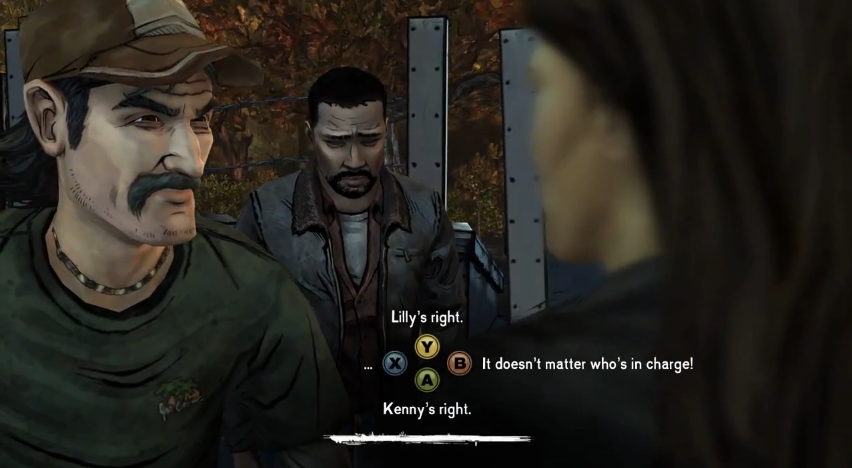Meaningful Decisions in Branching Narratives
A deep look into how games with branching narratives can build meaningful player choice.

The role of story in contemporary video games is generally a topic of controversy. Regardless of your stance on narrative in video games, we can safely agree that story based games are here to stay. So how then can we elevate narrative in games?

Fundamentally, games are about allowing a player to make meaningful decisions. Applying that statement to story means building systems where a player's decisions affect the narrative outcome. Technologically, we are currently incapable of creating systems where stories can be procedurally generated based on interactions. Until that day of supreme artificial intelligence arrives, we are confined to narratives that branch statically at predetermined paths. Naturally this means that most of these branches must converge at a finite number of leaf nodes so that artists aren't making cut scenes for a single game for the rest of their lives! So how then do we make story decisions feel meaningful?
Most games handle this by making narrative decisions a part of some larger gameplay system. For example, in Mass Effect most decisions are personality classifications that are either 'Paragon' or 'Renegade' and the players decisions adds on to a meter. Based on a player's current level on the meter, different options in the game are unlocked. While this is a fine way of providing a player a goal, it doesn't really create a meaningful decision making system from the story's perspective.

There is one company that strives for this ideal. Its name is Telltale Games. The games produced are simple point and click adventures where players select from a predetermined list of options. Nevertheless, these selections feel meaningful. The player is made to feel the consequence of his/her actions, even though it is an illusion. How?
This illusion is created by forming a basis for players to be making decisions intelligibly and providing feedback mechanisms that convey consequence. This thought process is built into the creation of the story, its characters and gameplay. The following are a few takeaways from 'The Walking Dead' that are fairly generalizeable:
A) PREDICTION OF CONSEQUENCE - The selection of dialog options is meaningful only when the player has a basis to predict the consequence of each option. Giving the player this basis allows him/her the ability to make brief evaluations of the different options at hand, instead of simply selecting by instinct or predisposition.
Example 1: Decisions representing distinct emotional reactions to a situation. This allows the player some authority over the protagonist's personality while also trying to assess the best emotional
response to solve the story problem at hand.
Example 2: Decisions that yield answers to different questions. This forces the player to ask himself what he wants to know about a character or situation, to solve the given story problem.
B) PROTAGONIST CONSTRUCTION - - ‘The Walking Dead’ establishes consequence based on player decisions masterfully, but unlike ‘Dragon Age’ and ‘Skyrim’, the game is very much Lee Everett’s story; not yours. The main protagonist’s character therefore is an interesting balance between leaving personality gaps for the player to fill in, and establishing a base set of characteristics. This balance is crucial as it directly impacts the mindset of the player. The base set of characteristics needs to be wide enough to :
o Establish character goals that in turn translate into gameplay goals
o Justify moments where player agency is limited to narrow set of options.
However, it is also has to be narrow enough for the provision of meaningful choices where the player believes that he/she is making decisions that fit the character. The premise of The Walking Dead assists in mitigating this problem as many of the decisions to be made are morally ambiguous and under high pressure. Lee’s established character goal is to protect Clementine, and ensure she stands a fighting chance to survive in his absence. In addition, he is dependable, resourceful and is deeply empathetic towards his fellow party members. The gaps the player fills in are:
a. How much of a leadership position he is willing to assume.
b. His mode of communicating the world to Clementine - Does he shield her from the horror of everything unfolding or does he expose her to it?
c. Individual vs Group - How much does he value individual characters when their goals are in conflict with the goals of the group?

C) FOCUSED RELATIONSHIPS - The player’s ability to track relationships are an important part of making informed decisions. The game presents the context of character relationships with laser sharp focus and in their very first meetings. For example, in Episode 1 the player forced to side with either Lilly or Kenny on multiple occasions. In their very first meeting in the pharmacy the two begin a power struggle that is reinforced at every possible juncture.
D) STREAMLINING DECISION TREE - One inevitable challenge that pops up in branching narratives is how to construct story when the plot state is dependent on the player. The game utilizes several techniques to streamline the decision tree and maintain the illusion of consequence :
o Deferred Story Events - It is impossible to deliver a compelling narrative without knowing whether characters are alive or dead. However, death or the possibility of death is the biggest antagonist in the game. The game resolves this by simply delaying character death based on decisions. For example, the option of saving Carly or Doug is ultimately inconsequential as either will die at the hands of Lilly one episode later.
o Manifestation of Consequence - The outcome of a decision does not have to match the exact manner in which the question was presented. For example, there comes a point where the player needs to choose between Shawn and Duck in a walker attack. Regardless of who the player picks, Shawn is killed. Instead the consequence manifests in the character’s reactions to the player’s choice, and their relationship with the protagonist being affected differently.
Link to Decision Tree : https://venturebeat.com/wp-content/uploads/2013/03/the-walking-dead-graph-by-gamesbeat.jpg?resize=1024%2C5624&strip=all?strip=all
E) FAVOR EXPLICIT OVER NUANCED FEEDBACK - An interesting mechanic the game employs on occasion is explicit feedback through flashing text on the screen. Example: “Clementine will remember that”. This is clearly a manifestation of a design concern of communicating to the player how their decisions are affecting game/narrative state. Intuitively you would think that all consequence should be communicated visually or within the narrative. This runs the risk of a player who hasn’t fully comprehended the significance of his actions and therefore the mechanic absolutely vital.
Read more about:
BlogsAbout the Author(s)
You May Also Like













